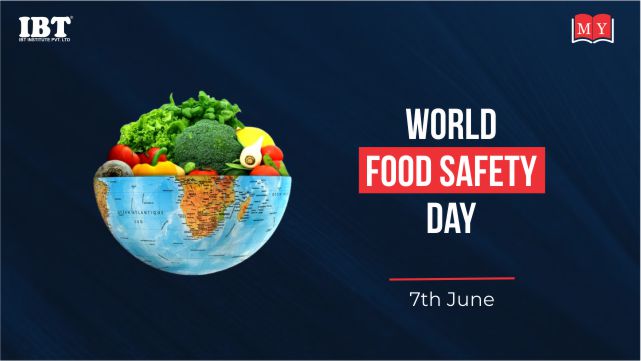World Food Safety Day: 07th June

World Food Safety Day: 07th June
Every year on June 7th, the world observes World Food Safety Day, a significant United Nations-backed initiative dedicated to highlighting the critical importance of safe food for human health, economic prosperity, and sustainable development. Established by the UN General Assembly in December 2018, with the first observance held in 2019, this day serves as a global call to action to prevent, detect, and manage foodborne risks.
Theme for 2025: "Food Safety: Science in Action"
The theme for World Food Safety Day 2025, "Food Safety: Science in Action," underscores the indispensable role of scientific knowledge and innovation in ensuring the food we eat is safe. From understanding how food can become contaminated to developing technologies for detection and prevention, science is the backbone of robust food safety systems. This theme emphasizes:
-
Investment in research and data collection: Governments are encouraged to support scientific research and gather data to inform policies and address emerging food safety challenges.
-
Evidence-based practices in businesses: Food businesses are urged to implement scientifically proven food safety management systems and contribute to data-collection efforts.
-
Informed consumer choices: Consumers are empowered to stay informed about safe food handling practices based on scientific guidance.
-
Building resilient food systems: The theme promotes the development of strong food safety systems that can adapt to challenges like climate change, global supply chain complexities, and evolving food demands.
Why is Food Safety So Important?
Unsafe food poses a significant threat to global public health and economies. Annually, an estimated 600 million people fall ill from foodborne diseases, with around 420,000 deaths. Children under five years old are disproportionately affected, accounting for 40% of the foodborne disease burden. Beyond human suffering, foodborne illnesses lead to substantial economic losses, estimated at around US$95 billion in lost productivity each year in low- and middle-income economies.
Food safety is not just about preventing illness; it is intrinsically linked to several of the UN Sustainable Development Goals (SDGs):
-
SDG 2 (Zero Hunger): There can be no food security without food safety. Ensuring access to safe, nutritious, and sufficient food for all is paramount.
-
SDG 3 (Good Health and Well-being): Food safety directly impacts people's health and nutritional intake, as foodborne diseases are largely preventable.
-
SDG 12 (Responsible Consumption and Production): Strengthening regulatory, scientific, and technological capacities for food safety contributes to more sustainable patterns of food production and consumption.
-
SDG 17 (Partnerships for the Goals): In a globally interconnected world with complex food systems, international cooperation across sectors is crucial to ensure food is safe.
A Shared Responsibility: From Farm to Fork
The observance of World Food Safety Day, jointly facilitated by the Food and Agriculture Organization of the United Nations (FAO) and the World Health Organization (WHO), emphasizes that food safety is a shared responsibility. Everyone along the food chain, from producers and processors to transporters, distributors, retailers, and consumers, has a vital role to play:
-
Governments: Must establish effective regulatory food control systems, invest in science, and provide access to clean water.
-
Producers: Need to adopt good agricultural and manufacturing practices.
-
Businesses: Must ensure food is safe through robust management systems and hygiene protocols.
-
Consumers: Should learn about safe food handling, storage, and preparation practices, and make informed choices.
How is World Food Safety Day Celebrated?
Around the globe, World Food Safety Day is marked by a variety of activities aimed at raising awareness and promoting action, including:
-
Educational seminars and webinars: Disseminating knowledge about food safety risks and prevention.
-
Public awareness campaigns: Utilizing digital platforms and community outreach to share key messages.
-
Demonstrations and workshops: Providing practical guidance on safe food handling.
-
Collaborative events: Bringing together governments, NGOs, businesses, and academic institutions to discuss and promote food safety solutions.
-
Policy discussions: Encouraging policymakers to strengthen food safety regulations and infrastructure.
By uniting under the theme "Food Safety: Science in Action," World Food Safety Day 2025 serves as a powerful reminder that science and innovation are essential for creating safer food systems and healthier societies. It calls upon individuals, communities, and governments to collaborate and take concrete actions to prevent foodborne diseases, ensuring that everyone has access to safe and nutritious food.
2 likes |
0 comment
 4.5/5
4.5/5








